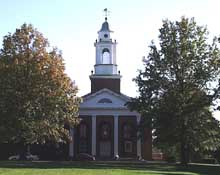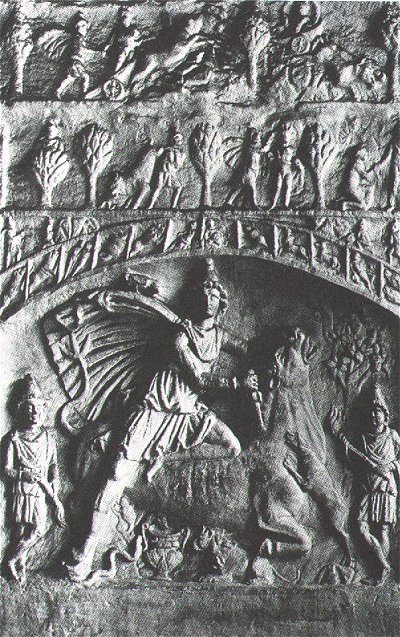Communal Worship
In the Qumran community worship was a very ordered and precise event. The Temple Scroll outlines in detail the events surrounding worship at Qumran. Worship is marked by sacrifices according to the community calendar. The following is a passage from the temple scroll describing the appropriate sacrifices.
They shall offer to YHWH an offering from the rams and the lambs, the right thigh, the breast, [the cheeks, the stomac]h and the foreleg as far as the shoulder bone, and they shall wave them as a wave-offering. [The priests'] portions [shall] be the thigh of the offering and the breast...[the foreleg]s, the cheeks and the stomachs...[as an eternal rule, from the children of Isra]el and the shoulder remaining of the foreleg [shall be for the Levites]...an eternal rule for them and for their seed..the princes of the thousands...[from] the rams and from [the lambs, one ram and one ram lamb (shall belong) to the priests; to the Levites], one [ra]m, one lamb; and to every [tribe, on]e [ram], one lamb for all the tri[bes], the [twe]lve tribes of Israel. They shall eat them [on that day, in the out]er [courtyard] before YHWH.
The passage shows the importance of which animals the priests sacrifice at which point in the calendar, as well as the importance of which parts of the animals are eaten. The Temple Scroll also shows the importance of hierarchy within the community. Many of the best portions from the sacrificial animals are reserved for the priests, others are reserved for the Levite priests, and others for the twelve tribes.
This passage contains rules for worship in the Qumran community and shows the importance of purity in worship.
No man who has had a nocturnal emission shall enter the sanctuary at all until three days have elapsed. He shall wash his garments and bathe on the first day and on the third day he shall wash his garments and bathe, and after sunset he shall enter the sanctuary. They shall not enter my sanctuary in their impure uncleanness and render it unclean. No man who has had sexual intercourse with his wife shall enter anywhere into the city of the sanctuary where I cause my name to abide, for three days. No blind man shall enter it in all his days and shall no profane the city where I abide, for I, YHWH, abide amongst the children of Israel for ever and ever.
Communal worship at Wabash takes place in several different forms. Wednesday morning religious chapel services and Thursday chapel services are just two such forms. Click on the links below to view information on different types of communal worship at Wabash College.
Video of clips from Wednesday Chapel with Doug Finn and Thursday Chapel with Professor David Blix
On Wednesday mornings students, faculty and staff gather for a religious chapel service in Tuttle Chapel. Either a faculty or staff member, or alumnus usually speaks, followed by a hymn. For the last few Wednesday chapel services of the school year, senior religion majors are invited to speak. This act of extending the floor to senior students can be seen as a right of passage. At the end of the Spring 2002 semester Doug Finn and Ben Kesling spoke for two Wednesday chapel services. These students were recognized by their religion professors as outstanding speakers and were invited to share their thoughts and words with the campus.
Thursday chapel services, held in the college chapel, are secular services, sometimes heathenistic in nature. They begin with a lecture given by a speaker of the Sphinx Club's choosing and conclude by singing the school song, "Old Wabash." These chapel services are often well attended and serve to rouse school spirit. Before important events in the life of the community special Thursday chapel services are held to recognize the events. On Thursday before the Monon Bell game against DePauw University, the school gathers in the chapel to support and uplift the football team as they prepare for battle. This chapel service becomes especially heathenistic as the men chant "DePauw Swallows!" again and again at an ear piercing volume. Thursday chapels have a history of hosting some eloquent and powerful speakers, as well as some not so eloquent or powerful.
Ecumenical Christmas Celebration
The Ecumenical Christmas Celebration occurs during the week before Fall semester final exams. This service, also held in the college chapel, celebrates Christmas by involving all denominations of Christians. Through singing religious Christmas music, listening to the college glee club, and hearing words of scripture, the Wabash community enjoys the season of Christ's birth. After the service, members of the community gather for the ritual food: cookies and red punch.
The Campus Crusade for Christ (CCC) is a religious sect that meets on Wednesday evenings to study the sacred texts of the New and Old Testaments. Their meetings include readings and studies of the texts and communal prayer. The CCC often includes food in their meetings as well.
Sunday Mass is a service held in the chapel by the catholic sect at Wabash. This service is led by a local priest, an official of the catholic sect who is dedicated to a life of selibacy and service to God.
Bacalaureat Chapel is a special chapel service for seniors and their families held on the day of graduation. This service serves to honor the seniors as they leave the community, as well as give worship to God.
Fellowship of Christian Athletes
The Fellowship of Christian Athletes meets on Thursday during the noon meal. Their purpose is to worship and uplift the athletic members of the Wabash community. However, their meetings are not attended solely by athletes. Other members of the community often come to the meetings, which involve a brief study of the sacred text and prayer.

